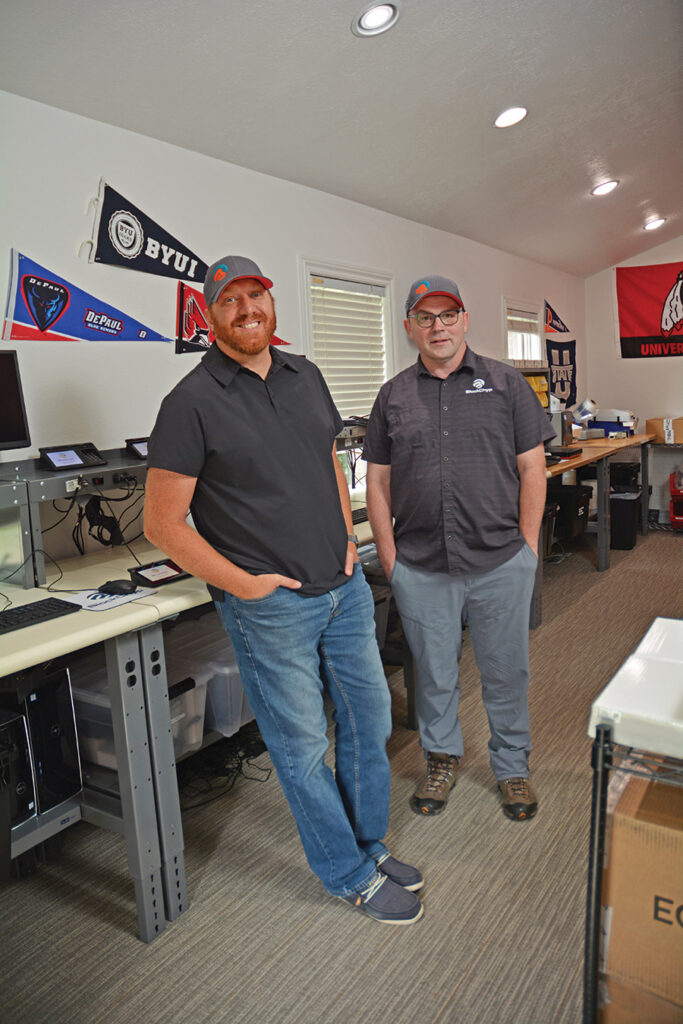Three-year growth 9,181%

Tap, swipe or insert to pay. Lindon-based BlockChyp allows independent software vendors to quickly and seamlessly integrate their systems with card-present payment terminals. With a cutting-edge tech platform, merchants get lightning-fast response times and industry-leading reliability.
BlockChyp advocates for mom-and-pop shops, focusing on retail spots like grocery stores, farm and feed stores, hardware, cell phone repair, etc. It has processed $1.5 billion in payment volume since launch in 2019, expecting to finish 2023 alone at $1 billion in payment volume.
Bonus swipe: They “accidentally” invented the world’s most secure gift card system.
Jeffrey Payne: Jon and I met working at a point-of-sale software company, Granbury Solutions. We saw the poor state of integrated payment technology: Outdated, brittle solutions coupled with unethical business practices.
After Granbury was acquired, I left to work for Princess Cruises while Jon was given the helm of Granbury. One day, we both happened to be in Miami on business and met up for General Tso’s Alligator. What started out as reminiscing (complaining) about the poor state of payment technology evolved into a potential startup idea.
Jon Decker:
Granbury owned about 20 different point-of-sales — in wine, pizza, coffee companies — with specific software for each one of those businesses. When I started to run the company, I realized that was a horrible problem. It would take 2-5 hours to get a merchant up-and-running because we had to work with all these different companies. So when we met in Miami, I told Jeff, “If we could make it easy for software companies to integrate into our product and easy for the merchant to start up, we would have something really great.”
Jeff: I said, “Sounds really hard. Probably wouldn’t work. But I’ll look into it.” *Cue laughs* I started experimenting with technical problems and Jon started breaking through gatekeepers at banks and equipment manufacturers. Little by little, the obstacles were overcome, and BlockChyp took off like a rocket.
Jon: We really concentrated on mom-and-pop businesses. They’ve evolved into needing to take credit card payments, which is a different process than other point-of-sales. To combine those two aspects is what Jeff and I have worked our whole careers trying to figure out.
Jeff: If you start a mom-and-pop shop from scratch, you might use Square or Clover for credit card payments. If you’re Walmart, you could write a check for half a billion dollars and build whatever software you want. The businesses in the middle don’t have great options. We provide that missing piece of the puzzle.
Jon: With BlockChyp, a software partner can integrate in 48 hours or less, where before it took 3-4 months to integrate into a credit card processor. It used to take 2-5 hours to get a merchant up and running, and now it’s less than five minutes. It pairs like a Roku to a TV.
Jeff: It took about a year to build everything from scratch. Then it was time to use it in real life.
We signed up a merchant called Pet Fun in Salinas, California — and we were terrified. We decided to fly down and do the install in person. We planned to be there four days because we assumed we’d be fighting fires and fixing problems. We got there and set up the terminals. The store opened, and everything was going fine. So we went across the street to a pizza place, got on our laptops and started watching logs in real time.
We were sweating, just waiting for stuff to break. We saw one little glitch. We coded a fix for the error, ran it through the system and deployed it live right then and there. That was the only problem we had the entire week. Pet Fun is still a customer to this day.
We do this for Main Street. You see good ole-fashioned Main Street merchants who have been on a crazy ride with payment systems. What we do is almost like activism. This work has to be done.
“Think of BlockChyp as a train station,” says Jon Decker, BlockChyp’s co-founder and CEO. “If you have all these different credit cards in your wallet, merchants would have to have direct relationships with all those banks. We are the hub so we can route that money to the appropriate places and back to the merchants.”